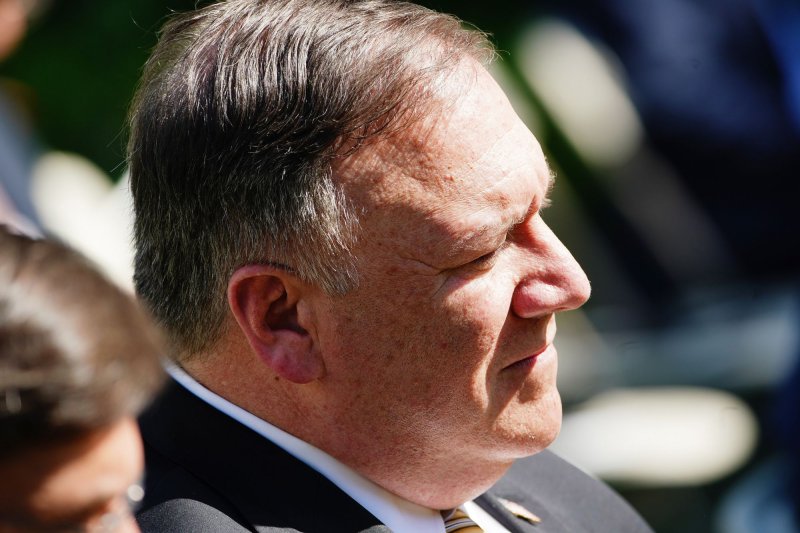U.S. Secretary of State Mike Pompeo said Thursday that the United States and its European Union partners need to combat China's ambitions to protect "our free societies, our prosperity and our future." Photo by Jim Lo Scalzo/UPI |
License Photo
June 25 (UPI) -- The United States has accepted the European Union's offer to create a new dialogue to discuss the threat China poses to the West, Secretary of State Mike Pompeo announced Thursday as he said the Trump administration is reviewing the U.S. military's global deployment strategy to ensure it is positioned to counter Chinese aggression.
Pompeo made the comments via video-link at the Brussels Forum, a conference on transatlantic issues run by the German Marshall Fund, stating the new U.S.-EU mechanism will discuss "the concerns we have about the threat China poses to the West and our shared democratic ideals."
The offer was made by EU High Representative for Foreign Affairs Jospeh Borrell in a phone call with Pompeo more than a week ago.
During the videoconference, Pompeo outlined numerous transgressions committed by China, including its "provocative military actions," against the global community.
"They include its continued aggression in the South China Sea, deadly border confrontations in India, an opaque nuclear program and threats against peaceful neighbors," he said, before detailing the Asian nation's human rights abuses and its "predatory economic practices."
Pompeo said Europe, like the United States, has been slow to see the threat posed by the Chinese Communist Party to free society but its alleged coverup of its initial outbreak of the coronavirus has "accelerated everyone's awakening."
"My message today is this: We have to work together to continue the transatlantic awakening to the China challenge in the interest of preserving our free societies, our prosperity and our future," he said, adding it won't be easy and many in the business community will be tempted by China's money but "there is no compromise between freedom and authoritarianism."
The United States' top diplomat said the Trump administration accepted the offer on the new mechanism because he doesn't want their future to be shaped by the Chinese Communist Party and he doubts his European counterparts want that either.
He said he looks forward to it starting as soon as possible while acknowledging there will be issues coming to a consensus on thwarting China's ambitions but that once the dialogue begins "a collective judgment" will coalesce creating "a set of collective responses that will preserve and protect those very freedoms that the Chinese Communist Party wants to undermine each and every day."
Pompeo also said that at the direction of President Donald Trump that there has been a review of the U.S. military's deployment over the last two and a half years, which will cause for fewer American resources to be deployed to certain areas while others will be reinforced to combat Chinese threats in India, Malaysia, Indonesia, the Philippines and the South China Sea.
"We're going to make sure we're postured appropriately to counter the PLA," Pompeo said, referring to the People's Liberation Army by its initials. "We think that's the challenge of our time, and we're going to make sure we have resources in place to do that."
He made the remark in response to a question concerning criticism the Trump administration has received over its recent decision to redeploy American troops from Germany, possibly exposing the European nation to increased threats from Russia.
Pompeo said adverse effects may be incurred by the redeployment of resources, but that may force countries to reconsider their own defensive strategies.
"It may be that other nations need to step up and take responsibility for their own defense in ways that they hadn't done previously," he said. "So we want to do this in full consultation with all of our partners all around the world, and certainly our friends in Europe."
He added that decisions were made on resource deployment at a different time "but it's often the case that the capacity to deter Russia or other adversaries isn't determined any longer by just having a bunch of folks garrisoned someplace."















